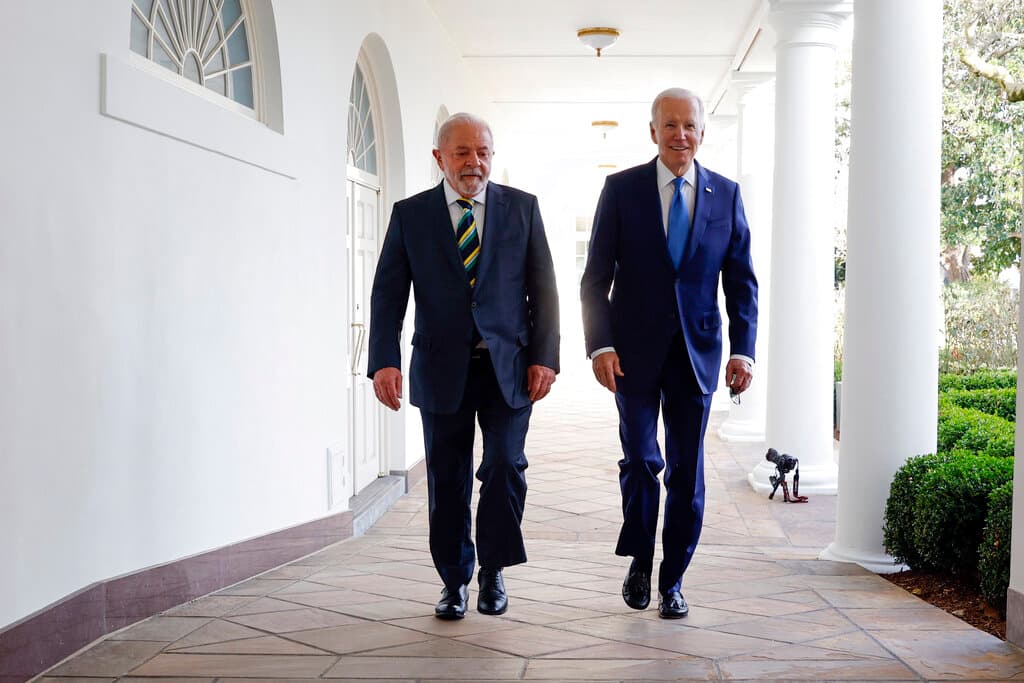Brazil’s Lula Declares Himself a Peace-Maker Between Russia and Ukraine
Leftist apparently wants to divert attention from economic troubles bedeviling his second presidency.

Move over, Nobel laureates, striped-pant diplomats, and beauty pageant contestants: President Lula da Silva of Brazil, a Russia-friendly leader attempting to turn himself into a figure on the world stage, wants to end the Russia-Ukraine war.
Not 100 days into his second presidency, the Brazilian leftist faces domestic difficulties, including an inability to deliver on a rosy election promise to turn around the country’s economy. Attempting to divert attention to a far-away war, Mr. da Silva now is calling for a peace powwow under the auspices of Latin American leaders.
Mr. da Silva spoke on the phone with President Zelensky last week and informed the Ukrainian leader that he would soon talk to his Mexican counterpart, Andres Manuel Lopez Obrador, to begin the peace process, according to local press reports. Mr. da Silva’s proposed summit, including possibly Ukrainian representatives, would be hosted by Latin American leaders, who have taken a “neutral” stance on Russia’s Ukraine invasion.
“The war between Ukraine and Russia is not good for anyone,” Mr. da Silva tweeted. “Brazil will participate in any effort towards peace, and I reaffirmed this to President Zelensky.”
Yet, while the local press reports that Lula’s advisors are already dreaming of his candidacy for a Nobel prize, he might not be quite the ideal peacemaker that he considers himself to be. “Lula is the wrong person to try to broker peace,” a professor at Baylor University who focuses on Ukrainian domestic and foreign policy, Sergiy Kudelia, tells the Sun. “If he tries, I don’t think he will succeed.”
Brazil’s “long-standing relationship with Russia” raises questions about the “reliability of Brazil as a mediator,” Mr. Kudelia says. Alongside India, Communist China, and South Africa, Moscow and Brasilia are part of the economic alliance known as Brics. Last year, Mr. da Silva said that Mr. Zelensky was extolled by European parliamentarians even as he was “as responsible as Putin for the war.”
In addition, Mr. da Silva blamed the European Union and America for “confronting” the Russian president by not cutting off negotiations over Ukraine’s entry into the European Union and NATO. Had America and Europe said that Ukraine would not be eligible to join those alliances, Mr. da Silva said, “that would have solved the problem.”
If Mr. da Silva again says “Ukraine should drop its NATO and European Union membership aspirations to achieve a compromise with Russia,” Mr. Kudelia says, “it will be rejected by the Ukrainian side.”
Mr Zelensky, for now, says that any peace plan must start with Russia withdrawing from Ukrainian territory, including the Russian-occupied region in the east and the Crimean peninsula.
“A peace process seems elusive as long as Russia continues to want to occupy Ukrainian territory,” a professor of International Relations at the School of International Service at American University, James Goldgeier, tells the Sun.
Last month, the Latin American leaders declined Washington’s plea to send unused, soon-to-rot arms to Ukraine. Brazil is not interested “in passing on munitions to be used in the war,” Mr. da Silva demurred. “Brazil is a country of peace.”
In the meantime, the Brazilian economic miracle that he promised in his presidential campaign is falling apart before it comes together. Last week the country’s gross domestic product shrank 0.2 percent, according to official data, breaking a five-quarter growth trend. Numbers are expected to continue to decline this year. In addition, Mr. da Silva managed to clash with investors and his Central Bank chief, Roberto Campos Neto, over monetary policy.
Yet, Mr. da Silva is invested in creating for himself an image of a foreign affairs global peacemaker. As he prepares to become the president of the intergovernmental forum G20 at the end of this year, his advisors confirm that “peace will be a central topic.”
Mr. da Silva has “no official plan or proposal” to begin peace negotiations between Russia and Ukraine, his advisors told reporters. For now he is in the process of having conversations with global leaders.
Mr. da Silva has met with President Biden and officials from France and Germany. At the end of the month, he will meet with Communist China’s party boss, Xi Jinping. “It’s time for China to get involved and to try and help find peace between Russia and Ukraine,” Mr. da Silva told a press conference.

